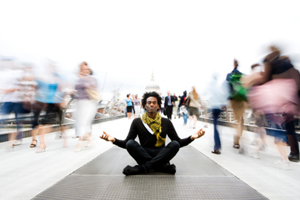The Tip of the Iceberg: Improve Your Wellbeing through Yoga and Meditation
Posted on Thursday, November 8th, 2018
Overall wellbeing requires us to take care of our mental, physical, and social health. When one of these areas is not strong, the others are affected too. It can be hard to find balance and prioritize your self-care when you’re busy. But what if I told you that you can give all three aspects of your wellbeing a boost with just one activity? And getting started is as simple as unrolling a yoga mat.
When practicing yoga with others, we attend to all three areas of wellbeing at once (talk about efficient!). Yoga can help you…
- Build self-esteem, as you learn to cultivate a more non-judgmental relationship with yourself and tame your inner critic.
- Improve your relationships. As we become less judgmental, we start to view things more compassionately and respond with kindness.
- Reduce stress and anxiety. When we are exposed to a sudden stress, we have a “fight or flight” response, which heightens our blood pressure, pulse rate, breathing and emotions. Yogic breathing and meditation can help to slow this stress response, so we can think more clearly
You might be thinking, “But I’m not flexible enough!” Don’t worry – yoga can be adapted for any physical ability. In fact, the physical poses (asanas) are just one aspect of yoga. They connect the movement of the body and the fluctuations of the mind to the rhythm of our breath (that’s a mouthful!). Connecting the mind, body, and breath helps us to be in the present moment, directs our attention inward, and has many benefits, especially for mental wellness.
Speaking of mind, meditation is a way to train the mind (much like fitness trains the body). In meditation, we practice making our minds  “quiet” or “still.” There are different ways to meditate. Two ways that can be implemented into daily activities are:
“quiet” or “still.” There are different ways to meditate. Two ways that can be implemented into daily activities are:
- Concentration meditation, which involves focusing on a single point.
- Mindfulness meditation, or learning to observe and be aware of our thoughts, feelings, and physical sensations without judging or clinging to them.
Tip: If you have anxious thoughts, try to mindfully observe your breath throughout your day, if even for a moment. Doing so can help to slow
your system, thoughts, and emotions. Think of your breath like snacks – if you eat regularly throughout the day, you won’t be starving by suppertime. Just as our appetite builds, our anxious thoughts can build and often hit in the evening. Regular moments of mindful
breathing throughout your day can help reduce the intensity of anxious thoughts at the end of the day.
In this post, counsellor Patti presents a concept from the world of counselling that you might find useful in your daily life.
- Posted in
- Uncategorized